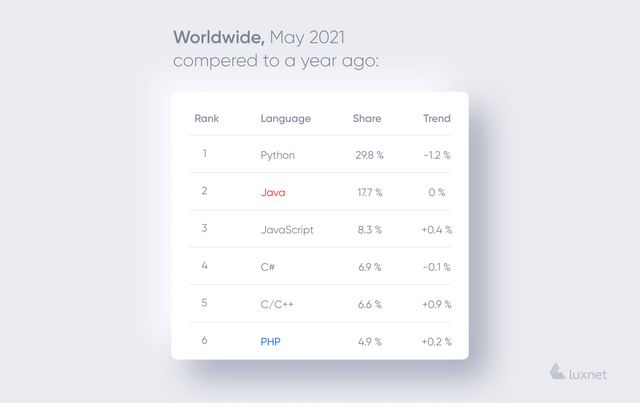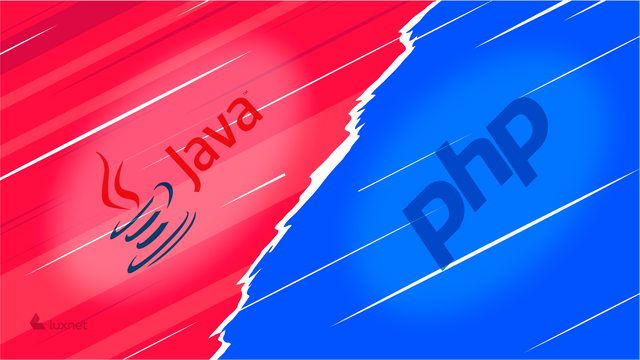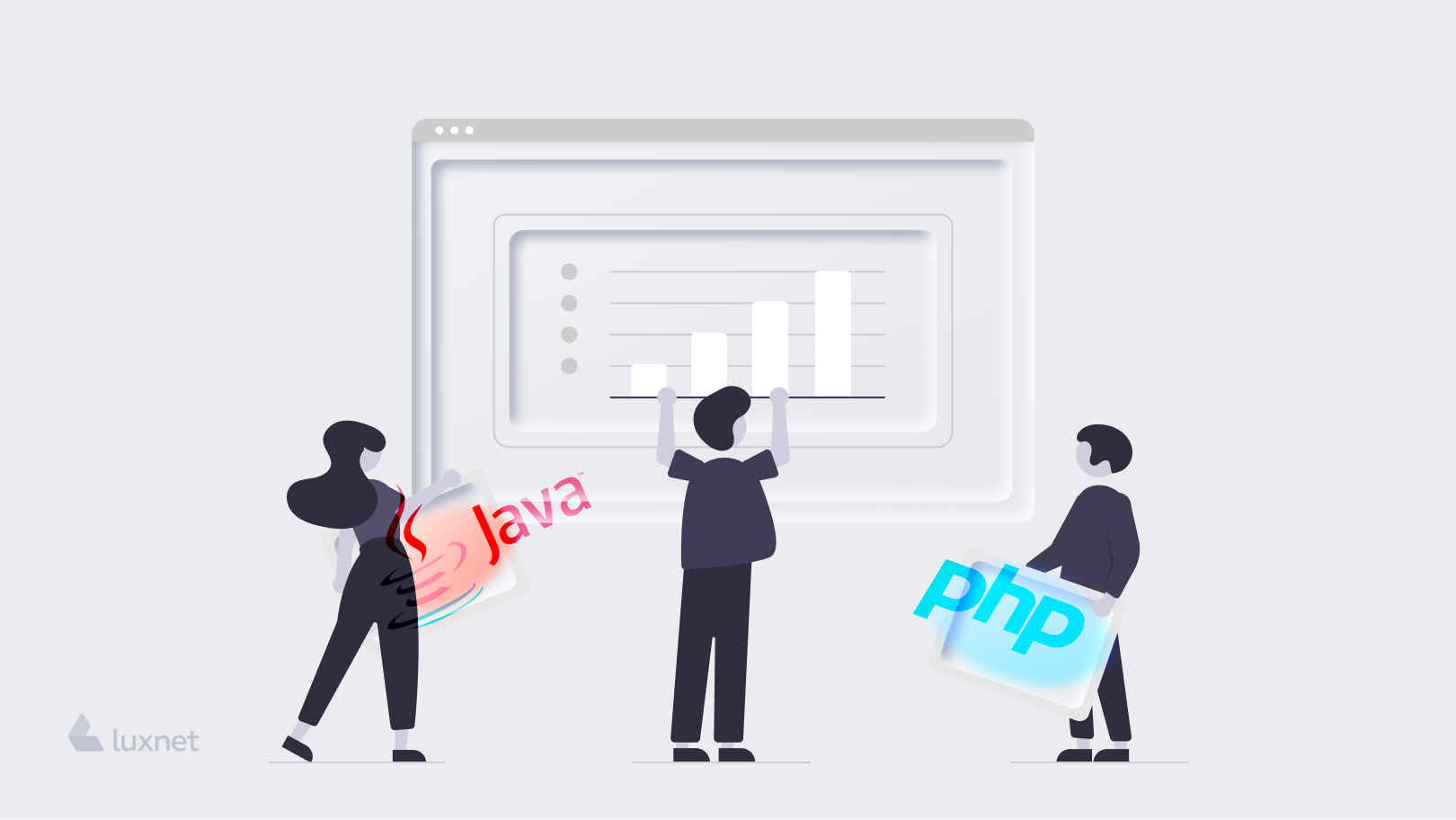In this article, you will read about PHP vs Java performance comparison and enterprise software. Moreover, we will constantly compare PHP versus Java.
What are enterprise applications?
Enterprise software is a software solution that should provide business logic and tools to model entire business processes to increase productivity and efficiency. Examples include billing systems, customer relationship management systems and supplier relationship management systems.
In simple terms, enterprise applications are programs that make business life much easier. Using enterprise applications, you can do all these actions: count money, add new employees to the database, monitor the content management system, etc.
Why are enterprise applications important?
In general, enterprise applications serve as a central hub of a system, where mass data are concentrated. All these data come from different sources. However, they can provide the integration of solutions related to the verification and enhancement of contact data.
Enterprise applications can provide:
- good customer relationships;
- enhanced company efficiency;
- accurate statistics based on data.
Usually, enterprise software is specifically designed to promote particular needs or, for example, business goals. The applications are based on the tools that formally ensure the company life: e-commerce, corporate communications, cooperation with customers or business partners.
Enterprise applications can provide the following services:
- online shopping;
- payments processing;
- creation and demonstration of e-catalogue;
- customer communication management;
- integration of production processes;
- IT service management;
- people management;
- monitoring of business analytics;
- management of business analytics;
- information security of a company;
- process automation.
As a rule, these programs model business processes. That is, reflect the work of the organization. Enterprise application tools can work by displaying, manipulating, and storing mass data.
If you think that an enterprise application is a terrifying, incomprehensible and complicated thing, it is quite the opposite. Such types of programs should be maximum comprehensible and convenient to use for company employees. In the ideal case, they are as functional as applications for customers. They have simple UX/UI, i.e. they are easy to understand intuitively.
What are the examples of enterprise applications?
Here are some of them:
- Customer relationship management system: a comprehensive strategy and process to get specific customers and collaborate with them in order to create higher value for the company and the customers. It is about the integration of marketing, sales, business customer service, etc. What for? The purpose is to track all current and future users, choose the most active among them, inform the user about new services and facilities, research consumer preferences, provide excellent service.
- Content management system: such an application will allow you to publish, edit and modify content, maintain it, implement your own rules, etc. What for? The purpose is to completely manage the content in one centralized system, create templates, search for necessary information in archives.
In addition, there are other enterprise applications:
- business continuity planning;
- enterprise resource planning;
- decision support system;
- business intelligence system;
- management and integration of all enterprise applications.
In conclusion, enterprise programs are aimed at integrating computer systems that perform all phases of company operations to facilitate collaboration and coordination of the entire business.
Where and how to start an enterprise application?
In the previous section, we have clarified that enterprise applications are not more terrifying than customer applications. Accordingly, they should be powerful and easy to use. Furthermore, they should improve the performance of the whole company in a particular way.
That is why you'd better turn to experts. They can suggest which programming language to choose for enterprise applications. Besides, we have created our own comparison - Java vs PHP: Which is the best for your business.
In short: What is Java?
Java is an object-oriented programming language. It partially borrowed the syntax from C and C ++. Its founders took the C ++ object model as a basis but modified it: they prevented the probability of certain conflict situations and made the program development process easier.
Advantages of Java
Primarily, Java, which has been used by programmers for over 25 years, served as a language to create standalone software. The source code of this artificial language is also compiled into machine code, and the binary code is interpreted by the Java virtual machine.
Other pros of Java are as follows:
- Object-oriented programming. It is the concept of coding when programmers determine not only the type of data and its structure but also a set of applied functions.
- Simple syntax and a smooth learning curve. Java is a high-level language, i.e. the encoding will be very similar to the human one. Unlike low-level languages, which resemble machine code, high-level languages were converted using compilers or interpreters.
- No security risks. The programming language itself does not protect you from security vulnerabilities, but you can take advantage of some of its features to avoid common security flaws.
In short: What is PHP?
Its primary name was Personal Home Page Tools. PHP is a server-side scripting language. Therefore, its first and main task is to generate HTML pages on the webserver side. The language is supported by the majority of hosting providers.
Advantages of PHP
That is one of the most common languages used by programmers for web development. According to GitHub, PHP ranks sixth, while Java сomes second.

Other pros of PHP are as follows:
the popularity of the language can help to find good professionals quickly;
a large database of quality reference and even training materials will help to implement projects of varying complexity;
there is a good website load performance and a lot of options to connect to a database.
Which one is a better choice for enterprise applications: PHP vs Java?
These programming languages might look similar but have some advantages and disadvantages. So, it is better to compare according to particular criteria.

Java vs PHP: performance and speed
Partly, everything depends on the size of your enterprise. If you have, for example, a holding company, lots of employees are likely to have access to the program. A Series of studies say that Java is much faster in this context. As a result, many people will be able to access the application immediately and appropriately.
In addition, Java uses multiple threads for quick and simultaneous handling and processing of numerous sequential commands. However, PHP 7.x allows developers to accelerate enterprise applications, and at the same time, reduce memory consumption significantly.
Java vs PHP: scalability
Both programming languages give scalable and flexible options for developing the programs you need. However, PHP will be the most effective in this case. It provides high scalability and allows developers to create programs easily.
Java vs PHP: security
PHP programming language does not have specific built-in security features that other programming languages contain. Therefore, when creating an application, developers should use security features and mechanisms from other PHP platforms. That will help protect the business application from malware attacks.
In this section, Java is more likely to win. New versions of this programming language have advanced security features to protect enterprise programs and data.
Java vs PHP: which to choose for web apps?
The PHP server language is a perfect option if you plan to create a website or web application for your company. This language is not limited by any specific parameters. For that reason, developers can easily create a web platform based on PHP, which will fully meet the customer needs.
Development cost: Java VS PHP
In any case, the development cost of an enterprise application will depend on the complexity of your project. That is why you should make a list of significant criteria before searching for PHP or Java developers. The questions to ask yourself might be as follows:
- How many people will use the application?
- What are the main features of the application?
- How much data is it necessary to store?
If to speak in detail, PHP is an open-source technology. That is, developers will be able to use PHP without paying any license fees. Developers can also use open-source PHP frameworks to speed up the development of such applications without increasing the total expenditures of projects.
Java will cost more in this regard. This programming language is not an open-source technology, so you will have to pay for it. But there are also advantages: if the program is created using Java, there will be a set of reliable tools for developing enterprise applications.
The case of Luxnet: high-quality development of enterprise applications
The Luxnet company also creates enterprise applications. One of our examples is the platform for BASF company. It is an international enterprise with several main business segments: chemicals, materials, solutions for industry, surfactants and technologies, nutrition and care, solutions for agriculture.
This service, which we have created, is a personal online account for a BASF specialist on his/her business tablet. There, the employee can manage all the necessary data related to the enterprise, and most importantly, fill in all the required forms to conduct experiments. The interface of the service is adapted for easy use and provides all the needed templates, which significantly simplifies the work.
You can read more about our case here.
